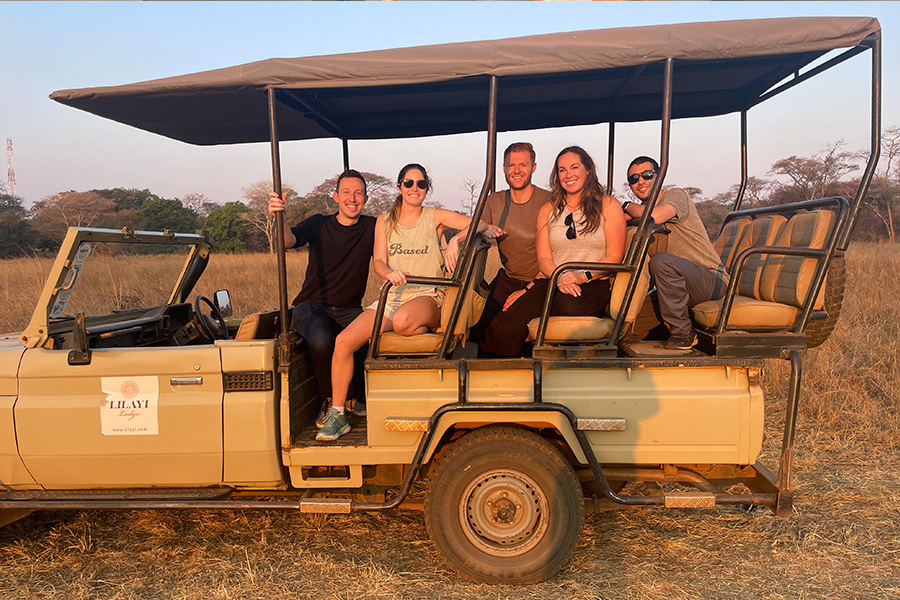The UNMC Department of Anesthesiology sent two teams of faculty, residents and fellows to the University Teaching Hospital in Lusaka, Zambia, as part of the Global Academic Anesthesia Consortium. The group provided clinical training to the residents of UTH, while learning more about the challenges and opportunities in Zambia’s health care system.
The GAAC is a collaboration of academic anesthesiology departments providing in-person and virtual anesthesia education programs, research, and perioperative clinical training in areas where a sustainable partnership is possible.
This was the department’s first global outreach trip to Zambia, with one team leaving Sep. 1 and returning Sep. 17, while the other was in Zambia for the second half of the month.
Director of Global Health for the Department of Anesthesiology Megan Chacon, MD, established the relationship with the GAAC because of the shared values of clinical care, education and research. The overall mission is to improve the educational and clinical experience of the residents and junior faculty at UTH.
As part of the GAAC, the department will help fill a void, providing perioperative clinical and educational training through lectures and hands-on training in the OR to the approximately 20 UTH residents. The educational aspect and sustained presence are what differentiate this program from previous mission trips, which were strictly clinical.
“The consortium allows for a constant presence and continuation of training in Zambia over several years,” Dr. Chacon said. “The participating institutions share planning of didactic training and curriculum development to really help them build a strong infrastructure of both education and clinical care. Our goal is to leave UTH faculty and residents with the skills to handle complex perioperative management and operative cases long after we’re gone.”
“There is an established anesthesiology residency program in place at UTH, with fully capable and motivated residents,” said Kyle Johnson, MD, assistant professor with the department. “But they lack the quantity of well-trained anesthesiologists to provide continuous training.”
Dr. Johnson described the start of the clinical day as similar to Nebraska Medicine – coordinating with residents, formulating anesthetic plans and pairing up to start cases. He said the program is a good experience for the team because they practice medicine in a resource-limited environment as well as increase critical thinking skills.
The training focused on regional anesthesia and point-of-care ultrasound, both beneficial because of the lack of CT and MRI availability and suboptimal recovery conditions. Dr. Chacon and her team held both a regional and PoCUS workshop for the residents.
“There were sometimes fewer options available,” Dr. Johnson said. “We can develop fairly sophisticated care plans here. At UTH, resources didn’t always work, or we’d discover on very short notice that medications were unavailable. We’d have to make last-minute decisions, creating the safest plan with what we had available.”
Logan Harrold, MD, said he learned to be more flexible during the trip. “Although we live in a resource-rich environment here at UNMC, supply chain issues continue to affect us daily, making the ability to adapt in real-time of critical importance,” he said.
Dr. Harrold said another challenge was the difficulty of building rapport with the providers in Zambia. “I think our team was able to overcome this obstacle and have a solid impact from clinical and educational perspectives,” he said.
Drs. Chacon and Johnson praised both UTH and UNMC residents for their motivation, collaboration and teamwork. “The UTH residents are very capable, fast learners and so eager to learn more in order to continue to care for their community,” they said. “Our residents benefited by learning how they approach things at UTH as opposed to how we do them.”
Another key element in the GAAC mission is research. There are plans to further strengthen the collaborative relationship by providing mentorship and support virtually for UTH residents preparing a quality improvement research project prior to graduation.
Drs. Chacon and Johnson said teaching residents and young faculty and seeing them improve patient skills they can immediately use was especially rewarding.
“I really appreciated getting to know the other members of the trip better and becoming a team over our two weeks together,” Dr. Harrold said. “Our experiences inside and outside of the hospital in Zambia are ones I will never forget.”
